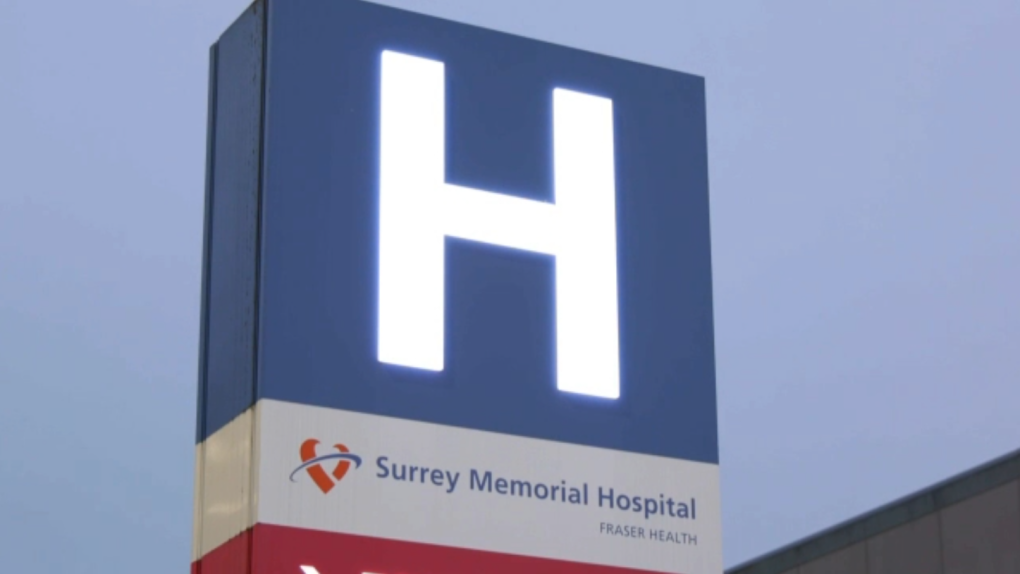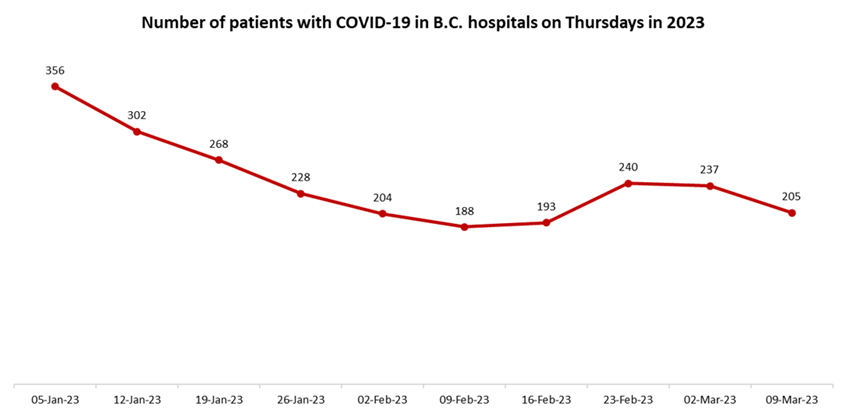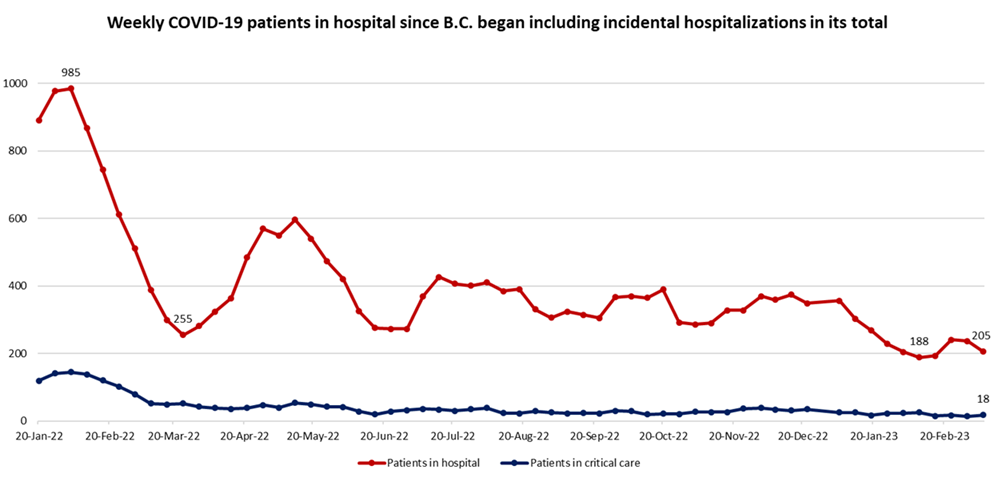B.C. COVID-19 hospitalizations declining again, but wastewater suggests spike may be coming
 A sign at the entrance to Surrey Memorial Hospital is seen on Saturday, Feb. 5, 2022. (CTV)
A sign at the entrance to Surrey Memorial Hospital is seen on Saturday, Feb. 5, 2022. (CTV)
The number of people with COVID-19 in B.C. hospitals decreased to 205 Thursday, a roughly 13.5-per-cent drop from the previous week. The latest wastewater surveillance data, however, suggests infections are rising.
The province's hospitalized population continues to fluctuate below 255, which was the lowest point it reached on any Thursday in 2022.
 The number of people hospitalized with COVID-19 in B.C. on Thursdays in 2023 is shown. (CTV)
The number of people hospitalized with COVID-19 in B.C. on Thursdays in 2023 is shown. (CTV) This graph shows the number of people hospitalized with COVID-19 in B.C. on Thursdays since the province switched to a "hospital census" model in January 2022. (CTV)
This graph shows the number of people hospitalized with COVID-19 in B.C. on Thursdays since the province switched to a "hospital census" model in January 2022. (CTV)
The hospitalization totals shown on the graphs include both those with serious cases of COVID-19 requiring medical treatment and "incidental" cases, in which a patient is hospitalized for some other reason and tests positive after admission.
Health officials estimate that between 40 and 50 per cent of hospitalizations are caused by the coronavirus, while the rest are incidental cases.
Since the province began counting hospitalizations this way in January 2022, there have been as many as 985 and as few as 188 test-positive patients in hospital on Thursdays.
WASTEWATER DATA
While hospitalizations have been declining, the B.C. Centre for Disease Control's monitoring of coronavirus concentrations in wastewater suggests they may not be for long.
An update to the centre's wastewater surveillance page Thursday afternoon shows concentrations have been rising in recent weeks at every treatment plant for which data is available.
For the week ending March 5, Metro Vancouver wastewater plants showed increases in viral load of between six and 14 per cent.
Treatment plants outside the Lower Mainland saw their concentrations increase by as much as 39 per cent (Kamloops) and as little as three per cent (Penticton) during the most recent week data was available.
OTHER DATA
The number of people currently in hospital is the only up-to-date data the BCCDC releases each week. All other data is released by "epidemiological week," a Sunday-to-Saturday period that is typically five days old by the time the data is published.
Still, the decline in the hospitalized population is matched by some of the other data released this week, including a declining number of new, lab-confirmed cases and a lower number of new hospital admissions – which is different from the number currently hospitalized.
This week, the BCCDC reports 347 new, lab-confirmed cases of COVID-19 across the province for the epidemiological week of Feb. 26 to March 4.
That's a decrease of about 14 per cent from the 404 the agency reported last week for the period ending Feb. 25.
Similarly, the BCCDC reports 79 new hospital admissions between Feb. 26 and March 4, down from 93 reported last week for the period ending Feb. 25.
This week, the previous week's total has been revised upwards to 123, and the BCCDC expects that this week's total will be revised upwards as well, "as data become more complete." Still, this week's lower starting point suggests new hospital admissions may be trending downward.
It should also be noted that there are a few caveats to the official case count. First, it only includes positive PCR tests, which are not available to most British Columbians with COVID-19 symptoms. Positive rapid antigen tests – the only type of test most residents can access – are not included.
Second, the BCCDC does not include reinfections in its weekly case count. This means someone who tested positive on a PCR test at the start of the pandemic in 2020 and tests positive again on admission to hospital in 2023 will not be included in the weekly total.
In November, the BCCDC said it was working to "better quantify" reinfections in its data. CTV News recently reached out to the agency for an update on those efforts, but has not yet received a response.
SPRING BOOSTERS
When they last held a news conference on COVID-19 in January, Health Minister Adrian Dix and provincial health officer Dr. Bonnie Henry attributed the relative stability of cases and hospitalizations in the province to the high levels of immunity generated through vaccination and recent infection.
While immunity from both vaccination and infection tends to wane over time, the province has, so far, not seen a significant resurgence of COVID-19 in 2023. Provincial data shows the opposite trend, with cases and hospitalizations consistently lower than they were for most of last year.
Henry and Dix are scheduled to address the media again on Friday at 1:30 p.m. "for an update on spring COVID-19 booster doses." The news conference will be live streamed here on CTVNewsVancouver.ca.
The province's last big vaccination campaign – which encouraged "fall boosters" for most residents, along with flu shots – saw less uptake than earlier COVID-19 vaccination efforts.
As of Thursday, 93 per cent of adults in the province had received at least a first dose of a COVID-19 vaccine, and 90 per cent had completed the initial, two-dose regimen, according to the BCCDC's vaccination coverage dashboard.
Significantly fewer people have had at least one booster dose, with 63 per cent of those 18 and older having had one as of Thursday. Only 38 per cent of B.C. adults have received four doses of vaccine, the total that would come from getting the initial shots plus a first booster and a "fall booster" when provincial health officials recommended them.
Correction
This story has been updated to correct the span covered by an epidemiological week. It is Sunday to Saturday, not Saturday to Sunday.
CTVNews.ca Top Stories

Trump threatens to try to take back the Panama Canal. Panama's president balks at the suggestion
Donald Trump suggested Sunday that his new administration could try to regain control of the Panama Canal that the United States “foolishly” ceded to its Central American ally, contending that shippers are charged “ridiculous” fees to pass through the vital transportation channel linking the Atlantic and Pacific Oceans.
Man handed 5th distracted driving charge for using cell phone on Hwy. 417 in Ottawa
An Ottawa driver was charged for using a cell phone behind the wheel on Sunday, the fifth time he has faced distracted driving charges.
Wrongfully convicted N.B. man has mixed feelings since exoneration
Robert Mailman, 76, was exonerated on Jan. 4 of a 1983 murder for which he and his friend Walter Gillespie served lengthy prison terms.
What's open and closed over the holidays in Canada
As Canadians take time off to celebrate the holidays, many federal offices, stores and businesses will be closed across the country on Christmas Day and New Year's Day.
Can the Governor General do what Pierre Poilievre is asking? This expert says no
A historically difficult week for Prime Minister Justin Trudeau and his Liberal government ended with a renewed push from Conservative Leader Pierre Poilievre to topple this government – this time in the form a letter to the Governor General.
opinion Christmas movies for people who don't like Christmas movies
The holidays can bring up a whole gamut of emotions, not just love and goodwill. So CTV film critic Richard Crouse offers up a list of Christmas movies for people who might not enjoy traditional Christmas movies.
More than 7,000 Jeep SUVs recalled in Canada over camera display concern
A software issue potentially affecting the rearview camera display in select Jeep Wagoneer and Grand Cherokee models has prompted a recall of more than 7,000 vehicles.
'I'm still thinking pinch me': lost puppy reunited with family after five years
After almost five years of searching and never giving up hope, the Tuffin family received the best Christmas gift they could have hoped for: being reunited with their long-lost puppy.
10 hospitalized after carbon monoxide poisoning in Ottawa's east end
The Ottawa Police Service says ten people were taken to hospital, with one of them in life-threatening condition, after being exposed to carbon monoxide in the neighbourhood of Vanier on Sunday morning.

































